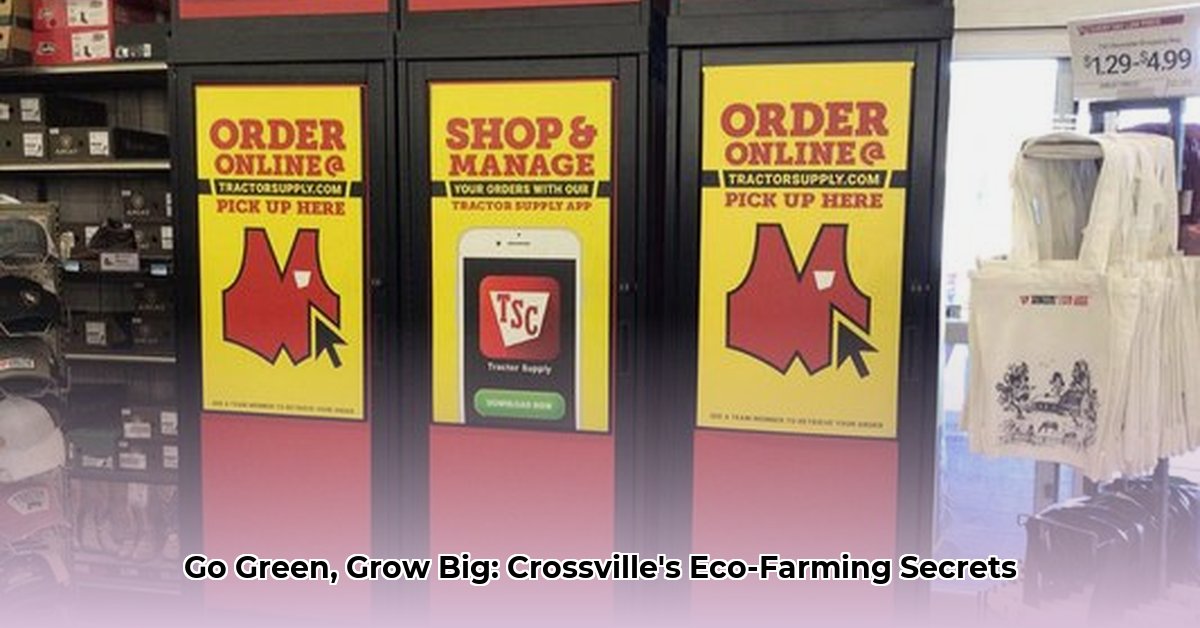
Crossville, Tennessee's Tractor Supply (TSC) store serves a vital role in the local agricultural community, providing farmers and gardeners with essential supplies. However, the extent to which this retail giant supports sustainable farming practices requires closer examination. This investigation explores TSC's contributions, limitations, and opportunities for improvement in promoting environmentally conscious agriculture in Crossville. For more information on composting, see our guide.
A Closer Look at Product Offerings: A Mixed Bag
TSC's Crossville location offers a broad range of products, including seeds, animal feed, tools, and fencing, many of which could be utilized in sustainable farming practices. The potential exists for farmers to source organic seeds (though their availability requires confirmation) and implement water-saving irrigation techniques using TSC's equipment. However, the store also stocks conventional products, making the overall sustainability impact dependent on individual consumer choices. The store's offering is a mixed bag, with the potential for positive contribution needing more transparency to realize its full potential.
Transparency Concerns: A Need for Clarity
A significant gap exists in TSC's approach: a lack of readily available information regarding the sourcing and environmental impact of its products. Unlike some competitors, TSC's website and in-store information do not prominently showcase certifications related to sustainable sourcing or organic product lines. This lack of transparency hinders accurate assessment of its overall contribution to local sustainable agriculture efforts. "The lack of clear labeling and readily available information about sustainable practices makes it difficult for consumers to make informed choices," notes Dr. Emily Carter, Professor of Agricultural Sustainability at the University of Tennessee.
Community Engagement: Unclear Involvement
While TSC's proximity to communities like Pleasant Hill and Mitchell Heights suggests a substantial local customer base, the store's direct involvement in promoting or supporting local sustainable farming initiatives remains unclear. Further investigation is needed to determine the extent of their community partnerships, if any, and their contributions to local initiatives promoting environmental awareness in the agricultural sector.
Water Management: A Critical Aspect
TSC's sale of livestock watering troughs is a relevant contribution, providing a necessary resource for local farms. However, the store's broader engagement with water conservation practices requires further investigation. Does TSC actively promote water-wise farming techniques or offer products specifically designed for efficient water usage? This area needs further exploration to fully understand its impact on sustainable water management in the Crossville region.
Recommendations for a Greener Future: Opportunities for Improvement
To significantly bolster its contribution to sustainable agriculture in Crossville, Tractor Supply should consider:
Enhanced Transparency: Implement a clear labeling system indicating the sustainability credentials (organic, sustainable sourcing, etc.) of its products. This would provide consumers with the information needed to make informed, environmentally conscious decisions.
Expansion of Sustainable Product Lines: Increase offerings of organic seeds, natural pest control methods, and eco-friendly fertilizers. A wider selection of environmentally responsible products would further support sustainable agricultural practices within the community.
Strengthened Community Partnerships: Actively engage with local organizations promoting sustainable agriculture, fostering collaboration and knowledge-sharing, and contributing to broader community initiatives related to environmental protection.
Consumer Action: Making Informed Choices
Consumers, including local farmers, can play a crucial role by making informed choices, actively seeking out and selecting sustainable options available at TSC while simultaneously advocating for greater product transparency. Supporting businesses that prioritize sustainability encourages broader industry adoption of environmentally responsible practices.
Conclusion: A Collaborative Approach
Building a sustainable agricultural ecosystem in Crossville requires a collaborative effort involving TSC, farmers, consumers, and community leaders. Open communication, transparency, and a shared commitment to sustainable practices are fundamental to creating a thriving and environmentally responsible agricultural landscape for the future. The journey towards a greener Crossville necessitates continued evaluation and improvement from all stakeholders.